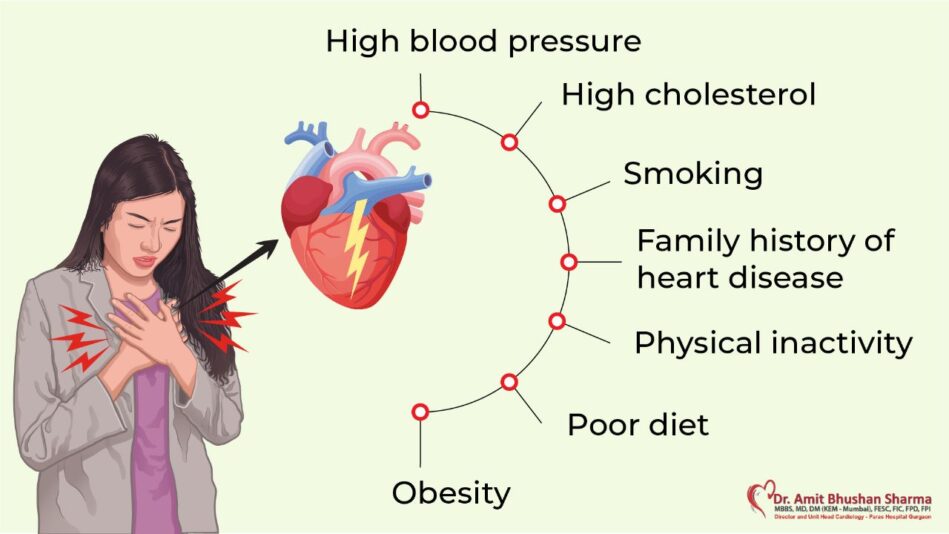Heart health is a crucial aspect of overall well-being, and it is especially important for women to understand its significance. Despite the common misconception that heart disease primarily affects men, it is the leading cause of death among women worldwide.
Due to this misconception, women who are having signs of a heart attack often don’t get the help they need right away, which could save their lives. In fact, women often wait more than six hours after the first sign of a heart attack before going to the emergency room.
Because timely interventions have the potential to save many lives, I would encourage you as a cardiologist to consider your own heart health as well as the heart health of the women in your life who are important to you.
We can make a positive impact on the future of women’s health if we educate and empower women to prioritize heart health. This is because taking care of our hearts implies taking care of ourselves.
How critical is ‘Heart Health In Women?’
Heart health is critical for women, as heart disease is a leading cause of death among women globally. In fact, cardiovascular disease, which includes heart disease and stroke, is responsible for more deaths in women each year than all cancers combined.
Many risk factors for heart disease, such as high blood pressure, high cholesterol, and smoking, are preventable and controllable. Maintaining a healthy lifestyle, including eating a nutritious diet, getting regular exercise, and managing stress, can help lower a woman’s risk of developing heart disease. It is also important for women to be aware of the symptoms of heart disease, which can be different in women than in men, and to seek medical attention if they experience any concerning symptoms.
Overall, taking care of heart health is a vital aspect of women’s health, and it is important for women to educate themselves about their risk factors and take steps to reduce their risk.
How can women take care of their heart health?
There are several steps women can take to maintain good heart health:
- Maintain a healthy lifestyle: Eating a nutritious diet that is low in saturated and trans fats, salt, and added sugars can help lower your risk of heart disease. Regular physical activity can also help lower your risk and improve your overall health. Aim for at least 30 minutes of moderate-intensity exercise, such as brisk walking, five days a week.
- Manage stress: Chronic stress can contribute to the development of heart disease, so it is important to manage stress in a healthy way. This can include practicing relaxation techniques, such as deep breathing, meditation, or yoga, and getting enough sleep.
- Avoid smoking and limit alcohol intake: Smoking is a major risk factor for heart disease, and even passive smoking can increase your risk. If you smoke, quitting is the best thing you can do for your heart health. Drinking alcohol in moderation, if at all, can also help lower your risk of heart disease.
- Monitor your blood pressure: High blood pressure is a leading risk factor for heart disease. Regularly monitoring your blood pressure and working with your doctor to control it, if necessary, can help lower your risk.
- Control your cholesterol: High cholesterol levels can increase your risk of heart disease. Eating a diet low in saturated and trans fats and high in fiber, as well as taking prescribed medications if necessary, can help control your cholesterol levels.
- Get regular check-ups: Regular check-ups with your doctor can help detect any potential heart health issues early, allowing for prompt treatment and management.
- Manage other health conditions: If you have other health conditions, such as diabetes, obesity, or sleep apnea, it is important to work with your doctor to manage these conditions, as they can also increase your risk of heart disease.
By following these steps, women can take an active role in maintaining their heart health and reducing their risk of heart disease.
Common risk factors for heart disease in women
Women’s heart health is unique, as they can experience different symptoms and risk factors compared to men. Some of the common risk factors for heart disease in women include:
High blood pressure: High blood pressure can damage the blood vessels, increasing the risk of heart disease.
High cholesterol: High levels of cholesterol in the blood can increase the risk of heart disease by depositing plaque in the arteries.
Smoking: Smoking is a major risk factor for heart disease and can damage the blood vessels, making them more prone to blockages.
Obesity: Excess body weight, especially in the abdominal area, can increase the risk of heart disease.
Physical inactivity: Lack of physical activity can increase the risk of heart disease, as well as other health problems.
Poor diet: A diet high in saturated and trans fats, salt, and added sugars can increase the risk of heart disease.
Family history of heart disease: A family history of heart disease can increase your risk of developing the condition.
Post-menopause: After menopause, women’s risk of heart disease increases, in part due to hormonal changes.
History of gestational diabetes or pre-eclampsia: Women who have had gestational diabetes or pre-eclampsia during pregnancy may be at increased risk of heart disease later in life.
It is important to be aware of these risk factors and to work with your doctor to manage them, if necessary. By doing so, women can reduce their risk of heart disease and improve their overall heart health.
To maintain good heart health, women can take several steps, such as eating a nutritious diet, getting regular physical activity, managing stress, avoiding smoking, monitoring their blood pressure, controlling their cholesterol, getting regular check-ups, and managing other health conditions.
It is important for women to be aware of their risk factors and take proactive steps to maintain their heart health. If you experience any symptoms that you think may be related to your heart health, it is important to seek medical attention right away. By taking care of their heart health, women can greatly improve their overall well-being and reduce their risk of heart disease.
Why is it necessary to take immediate help for any heart issues?
It is necessary to seek immediate medical attention for any heart issues because prompt treatment can greatly improve outcomes and reduce the risk of serious complications. The heart is a vital organ that plays a crucial role in our overall health, and even minor heart problems can lead to serious consequences if left untreated.
For example, chest pain or pressure can be a sign of a heart attack, which occurs when the blood flow to the heart muscle is blocked. Timely treatment for a heart attack can help minimize damage to the heart muscle and improve chances of survival.
Similarly, symptoms such as shortness of breath, lightheadedness, or rapid or irregular heartbeat can indicate heart problems, and seeking prompt medical attention can help diagnose and treat these conditions effectively.
Conclusion
In conclusion, early recognition and treatment of heart problems can improve outcomes and reduce the risk of serious complications. If you experience any symptoms that you think may be related to your heart health, it is important to seek medical attention right away.
This article has been written by Dr Amit Bhushan Sharma
Dr Amit Bhushan Sharma is the Director & Unit Head Cardiology at Paras Hospital, Gurgaon. He is an eminent cardiologist with over 20000 trans radial angioplasties and over 3000 pacemakers, AICD, CRTD, implants to his credit. He has an an extensive experience of 27+ years. He is an expert in complex angioplasties done through the wrist and is only an Interventional cardiologist in Delhi NCR to have ECFMG Certification ( United states Certification ) with 2 accredited fellowships from the premier institutes of united states namely Mount Sinai New York and Michigan State University.
He can be reached at
Email : [email protected] Website : https://amitsharmacardiologist.com/
Address : Paras Hospital, C-1, Sushant Lok- 1,
Sector-43, Phase- I, Gurugram, Haryana,
Timing – Mon – Sat(11:00 AM – 05:00 PM)
+91-1244585555 , +91 93139 42093
Address : Cedar Crest-27, Nirvana Country,
Sector 50, Gurugram, Haryana,
Timing – Mon – Sat(5:00 PM – 08:00 PM)
+91 93139 42093







